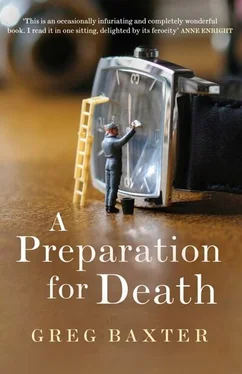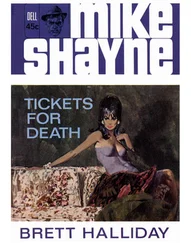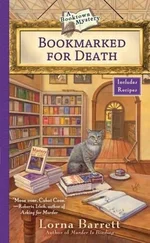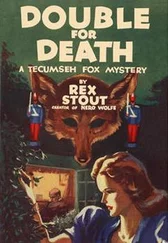We walked a little further. For a little while we lay on a patch of grass so I could try to sleep. I was badly hungover. Beside us, people in shorts and flip-flops mobbed the pier. And though I could not sleep — I can hardly ever sleep — I closed my eyes and put my hands on Clare’s belly, which is soft and flat and white, and has a few moles on it.
I tend to idle with anxiety — I always feel that I’m forgetting something. Clare idles with a nonchalance so stylish that it borders on the professional. It is as though she could sit still, admiring her own contentment, during an earthquake.
We hiked up Howth Head to avoid drinking too early. I had seen it from the sea many times. It is dark green and gorse-patched, with sheer rock cliffs. When you are on a boat, the head seems merely large, but when you are looking from the head to the water, you feel as though you’re on a mountain, and that a gust might throw you to your death. That day the sea was calm and the waves bashed the rocks quietly. We walked beside each other when the path was wide enough, and single file when it narrowed. We passed a woman with a video camera. She was filming the sea while talking to a friend: the camera would experience the moment for her.
We had a pint outside a small hotel in Howth village. A group of drunk English tourists were shouting and drinking cider in the last hour or two of high sunlight, sunlight still above the rooftops opposite. They were all very sunburned and this made them feel beautiful. The men wore unbuttoned shirts and the women wore white trousers. One woman, sitting down, suddenly fell into the bushes.
We took a late train back home — it was filled with the same crowds that had come out with us, but now they were slumbering — and had some wine on the terrace. Summer had arrived. I was disconsolate: the world was unstoppable. We went to bed and she undressed. I kept my clothes on for a few minutes and examined every inch of her. I put my hands around her throat. She has large soft breasts, and they flatten when she is on her back. She has multiple orgasms and goes limp for a while after them.
The next day, after breakfast and coffee, we sat on the terrace again — there is nowhere else one would sit in pleasant weather — and she sat on my lap and we kissed in the sunlight. The whole thing — the first warmth of the year, breakfast outside, the sound of airplanes — aroused her so much that she gave me head in plain sight of the third-storey windows across the street, all open. We spent the afternoon in bed. She came again and again, and slept, and I scratched her back and bottom while she slept. I felt, that day, that I was twenty-one again, and no part of the past decade had taken place.
I am going to miss Helen much more than she knows. She has become an ersatz wife. She is messy and poor, and has no interest in chit-chat. If I liked her music, I would throw myself at her feet and beg her to love me. Instead we operate in proximity but separately.
It is delightful to watch her morning rituals. Since she works different hours every week, I catch different episodes of it. And sometimes on weekends, if I am up writing, I can observe it entirely. It begins like a single bee sucking nectar out of a flower, delightful, beautiful, delicate, and gradually others arrive, until suddenly the sky is black with a swarm of them.
She wakes more than two hours before she must leave the house — the intent is to finally, for once in her life, not be late. First she goes upstairs to the kitchen and dining room, makes a cup of tea, and reads a book. She has good taste in books, and a broad appetite. She sits on a chair at the kitchen table, knees pulled up to her chin, and holds the book at a distance, sipping her tea, black, never removing the bag. Because the weather is warmer, she wears a vest top and boxers — in the winter she wore a thick black hooded jumper and check pyjama bottoms. Either way she is rather exquisite — not merely pretty but perfectly calm. When her tea is finished she goes downstairs to take a shower. This is where her schedule falls apart. She takes showers that last forty minutes. She says it is because she has lots of hair and must wash it completely. Sometimes she must wash it twice. The idea of her washing her hair for such a long time suffuses me with calm. I imagine she must wash every strand. I imagine she has no thoughts at all — that she becomes nothing more than the sound of a woman washing her hair, the sound of water on a body. When she emerges, she returns to the kitchen to read more and have another cup of tea and breakfast, which is usually a piece of toast. She already knows she will be late, but she must have peace with breakfast. Her hair is wet and thick and very black, and there are times I have wanted to put my hands on it — if only to lower my heart rate. Again she falls into a silence. When she is in this state, one must not speak to her. One feels that to make noise would be to shatter something precious. Then she will check her phone for the time, and slowly the swarm begins to gather. She jogs downstairs to put on make-up. This always takes longer than she expects, and then she must dry her hair. Because there is no socket in the bathroom, and no mirrors anywhere else but in the bathroom, she stands in front of the upstairs window — she has run upstairs — with a blow-dryer and a comb and watches herself in the reflection of the glass. She is always, at this stage, in a vest top and jeans or a skirt. She has a short tartan skirt that makes me feel like a paedophile. Her waist is nothing. I could reach around it with two hands — touching my thumbs and fingertips. The drying takes forever. Her hair comes down to the middle of her back. The repetition of combing and drying is slow and patient, but after fifteen minutes it becomes erratic, and she is full of sighs, and threatens to shave it all off. If I am watching, she asks me what time it is every minute. She never quite finishes — she always only has five minutes left, and there are still a million things to do. From then, it is all panic, running, stomping, doors slamming behind her, until a voice calls distantly from below, Goodbye! Then the front door shuts and she flies silently to the bus stop, and the air is empty again.
A new beginners course began tonight — a Thursday, mid-May — and now I am home after four straight nights of teaching. It is almost midnight. Helen has left an open bottle of red wine in the fridge. It tastes like cold, sour raspberries. I am too tired to write. My brain is exhausted. It is like this every night. I would like to say everything, but I can’t think to remember any of it. I will go downstairs and sleep without reading. The corpse of what I could say now, if I had the energy, tumbles into lost time, on top of all the others.
The clouds are a hundred shades of grey. It is like being in the centre of a nebula. You could spend your whole life staring upwards in Texas, and never see anything like them.
The future is a city. And I am the dream of a man who died in it. But I am also the dream that murdered that man.
A man who writes loves his city more than his own life or death — a failed writer all the more. The city inspires him, but refuses to belong to him. It endures all his nonsense. It does not requite his obsession.
In the evenings after class, after drinks, I wait for the bus at the bottom of O’Connell Street, on Eden Quay. The stop is just outside a lap-dancing club, the Garden of Eden, and patrons — fat foreign men in scuffed leather jackets and necklaces — tiptoe in and out. I am going in, as soon as I can afford to. The daylight is unimaginable now — almost five years in Ireland and I still cannot get used to it — and even at eleven there is still a little blue in the sky. The north quays toward Connolly Station — this is how half the city goes home — are frenetic. Cars honk their horns, but nobody cares. Last night, a Monday night, the moon was gold and shining in a sheet of haze. I can’t afford cigarettes, but I am still buying them. I’ve decided to cut back on dinner, and just eat sandwiches for the rest of my life. Passengers gather at the bus stop. Ten minutes pass, fifteen. Buses mass at the light on Westmoreland Street, across the bridge. I squint to read their numbers — none of them are mine. The light goes green and they trot up O’Connell Street like fat cattle. I tell myself that this is experience, this waiting.
Читать дальше












